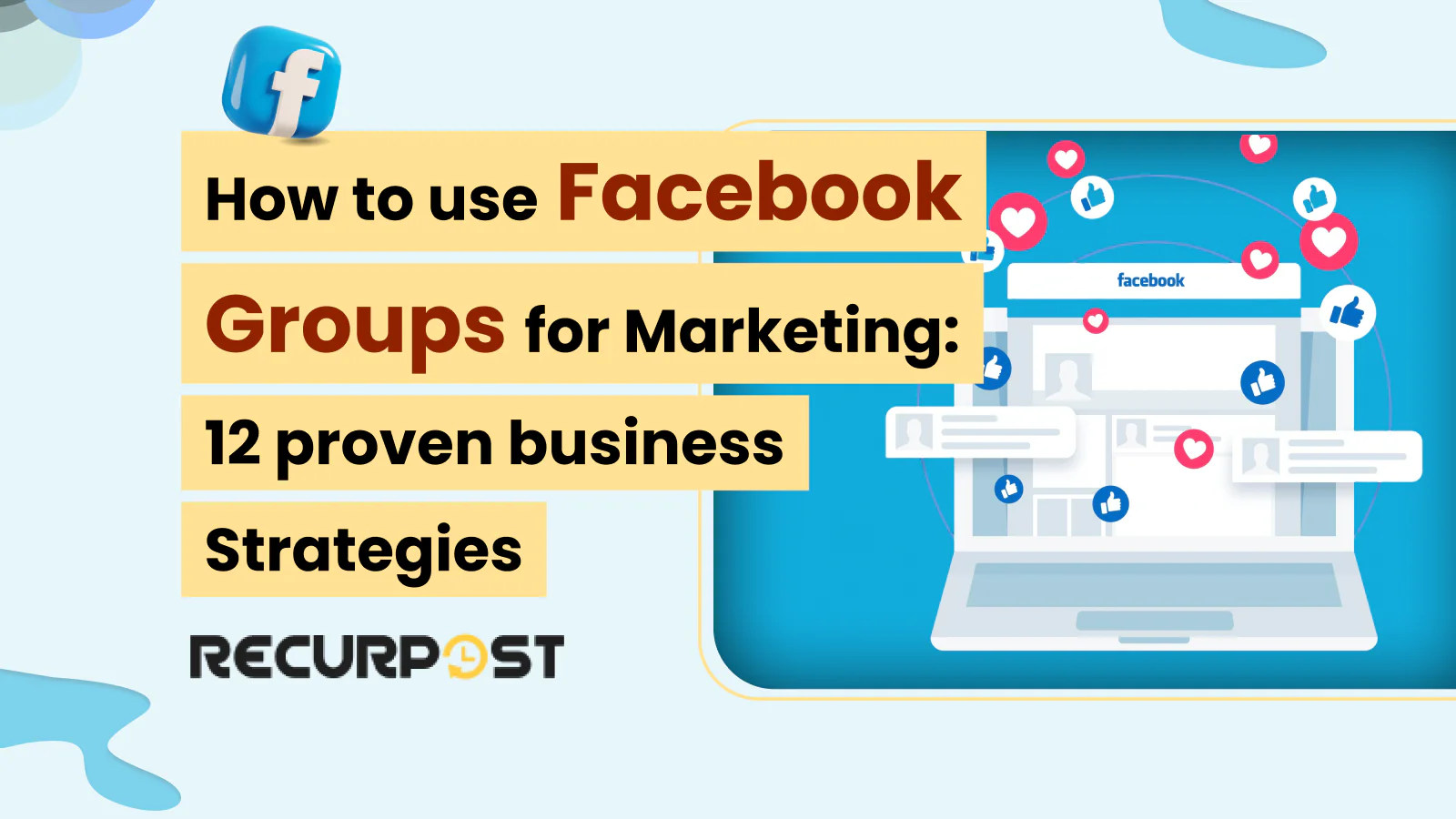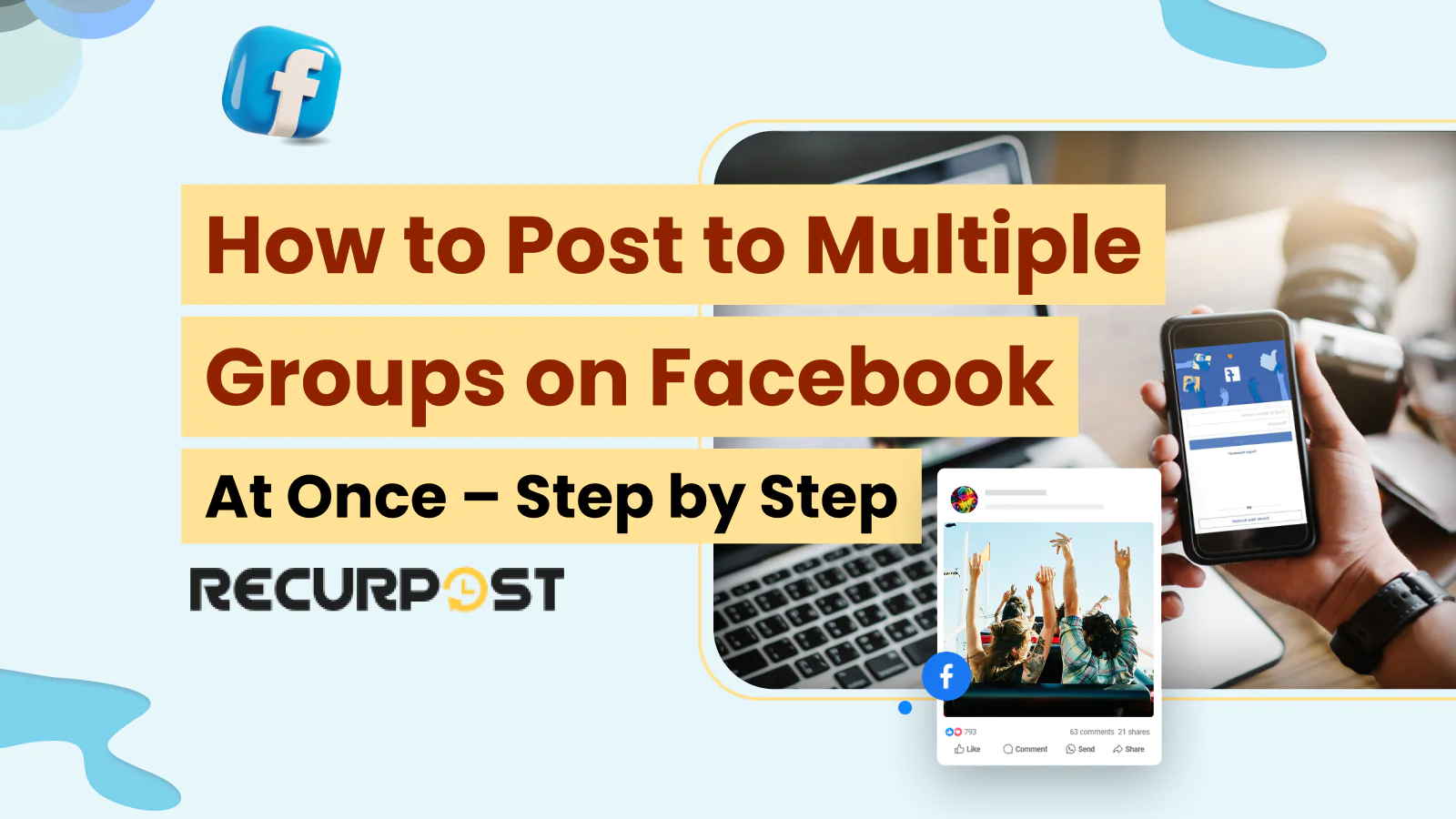Facebook Groups for marketing have become a go-to space in 2025, giving any business the ability to build real communities around their brand using Facebook.
With around 1.8 billion monthly Facebook Group users and over 25 million active public groups, these groups present big wins for businesses across the board.
While a Facebook Page often struggles with organic reach, Facebook Groups keep buzzing with engagement, acting as community hot spots.
Nearly 91% of organizations keep their presence on Facebook, showing how vital it is for Facebook group marketing strategies and business-focused Facebook communities.
What makes these groups work so well? Globally, people spend about 31 minutes daily on Facebook, and Facebook Groups keep them coming back.
That kind of Facebook community engagement is a golden chance for any business owner to connect directly with an interested audience.
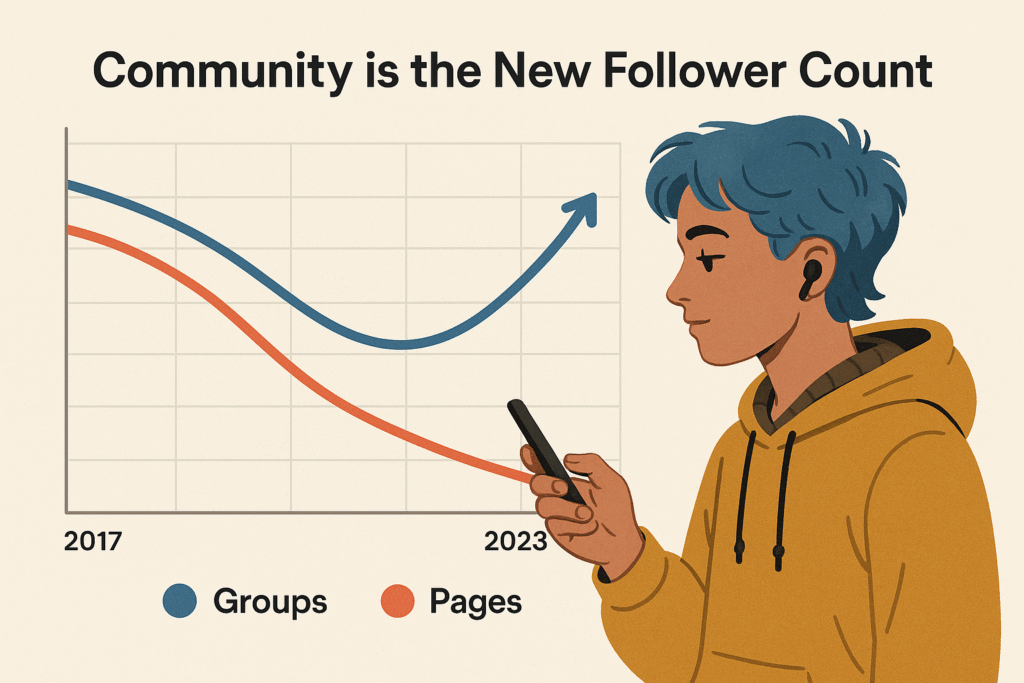
Marketing experts now say that “community is the new follower count”, a belief shaping how businesses use Facebook Groups today.
It reflects a shift from content-first methods to community-centric marketing using Facebook Groups for marketing.
Instead of broadcasting to passive audiences, businesses now use Facebook Group marketing to create spaces where group members participate, comment, and connect.
Reports show 76% of small businesses using social media now include Facebook Groups in their marketing strategies, and 78% report higher customer engagement than regular Facebook Page posts.
How Facebook Prioritizes Group Content
The Facebook algorithm now favors Facebook Group content in ways that directly help anyone using Facebook Groups for marketing.
Users visiting the Groups tab often see top group posts from public Facebook Groups, picked based on their interests [Facebook].
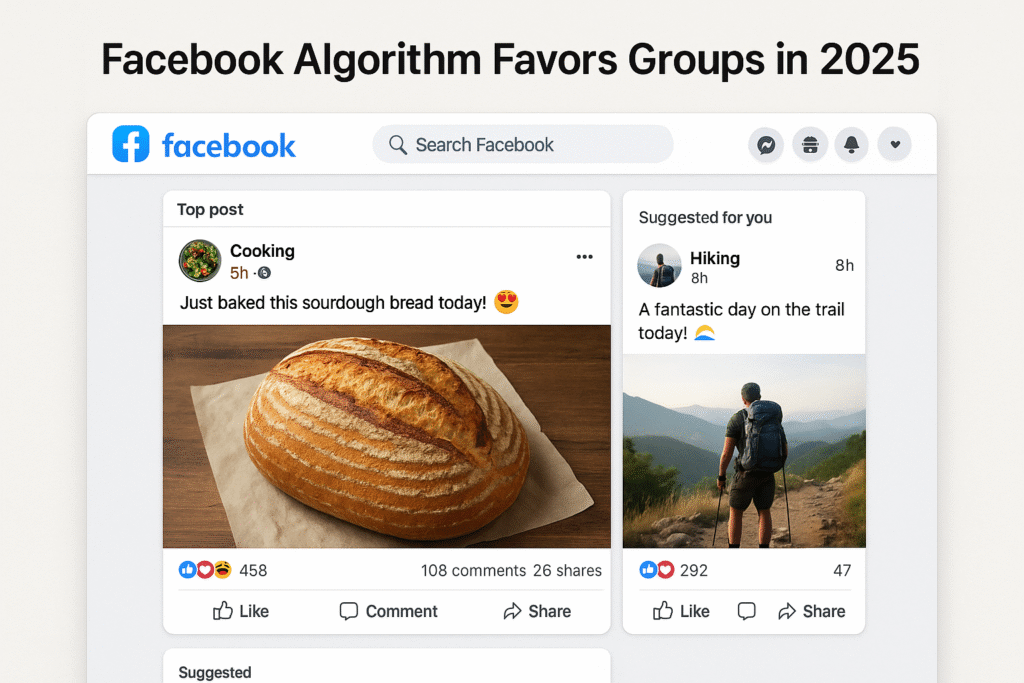
The platform promotes Facebook Groups actively through:
1. Increased visibility in news feeds for active group members
2. Regular notifications about Group activity, pulling members back
3. Suggesting similar groups to encourage members to join more
4. Even offering group visibility in web search results outside Facebook
These algorithm-driven boosts create direct advantages for businesses using Facebook Groups for marketing.
Back at Facebook’s 2019 F8 Conference, Zuckerberg said people “may see more content from Groups in their news feed,” and that push hasn’t slowed down.
According to Facebook research, Gen Z and younger demographics engage better when brands post in Facebook Groups and offer real value.
That opens doors to reach younger audiences who may not respond to typical Facebook Page campaigns.
Facebook Groups for marketing also cost less than ads. No big spend, just consistent group engagement.
Many brands say Facebook Groups offer an exceptional return on investment, especially in today’s tighter marketing budget environment.
These groups also work as an easy group analytics tool and post-purchase loyalty strategy, packed with valuable product feedback.
For many businesses, the Facebook Group insights serve as a free focus group alternative that skips expensive research.
Businesses using Facebook Groups successfully often stick to smart habits:
- Posting authentic group content, not just promo blasts
- Keeping discussions on track through solid group admin moderation
- Gathering direct group feedback to steer bigger marketing strategies
- Spotting loyal group members to build real community engagement
In a noisy space, Facebook Groups remain a smart Facebook group marketing strategy that blends brand awareness with genuine conversation.
They strike a rare balance between brand visibility and community-centric marketing — something most Facebook marketing groups can’t replicate.
Choosing the Right Type of Facebook Group
Picking the right type of Facebook Group is key when you’re building a community or starting Facebook Group marketing for your business.
With over 620 million Facebook Groups out there, the group type you choose matters, especially when you’re thinking about group discoverability and member interaction.
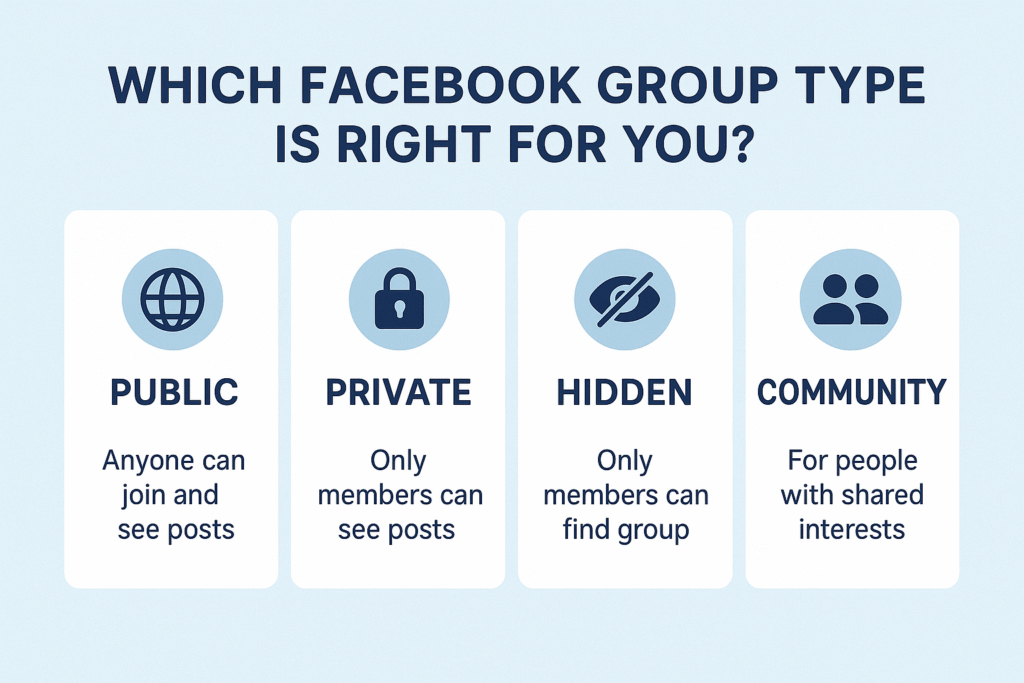
Public vs Private vs Hidden vs Community
Facebook gives you four main group types to pick from, each with its own group features, access, and privacy settings.
1. Public Groups
Everything is open. Posts, group comments, group members, and group content show up in both Facebook searches and Google searches.
- Anyone can find this group using the Facebook Groups search engine
- Group posts and replies are open even to non-members
- You can view all the members, even if you haven’t joined
- Group content may appear in Google searches
- No admin approval needed, anybody can jump in
While public Facebook Groups get great reach, they come with trade-offs: spam, fake profiles, and weaker moderation alerts.
2. Private Groups (Visible)
These groups offer admin control while still appearing in Facebook Group search.
- The group name, group description, and group type are searchable
- No group posts or member content are open to the public
- Only approved members can access the group feed
- Joining still needs admin approval, keeping things tight
This option provides substantial control while maintaining discoverability, making it especially valuable for business purposes.
3. Private Groups (Hidden)
Also called “secret groups”, they’re perfect for exclusive content or high-trust membership.
- The group doesn’t appear in any search results
- Only current members can see that the group exists
- Prospective members need a direct URL to find the group
- Admin approval is required to join
Hidden groups work well for exclusive communities or support groups tied to paid products, where you want to limit membership strictly.
4. Community Groups
These are built for discussion threads, community engagement, and learning.
- You can make them public groups or private, depending on your goals
- Built-in Facebook group features include mentorship, Q&A, and group guides
- Group admins can organise posts with the Facebook Guides feature
- Members can be matched with mentors or contribute to structured learning paths
These are a perfect match for brands, digital marketing groups, or online business communities on Facebook who want to nurture engagement and deliver value over time.
12 Proven Business Strategies for Facebook Group Marketing
Here are 12 proven Facebook Group marketing strategies that can turn your Facebook Group into a valuable marketing tool.
1. Cultivate Exclusive Content & Facebook Group Communities
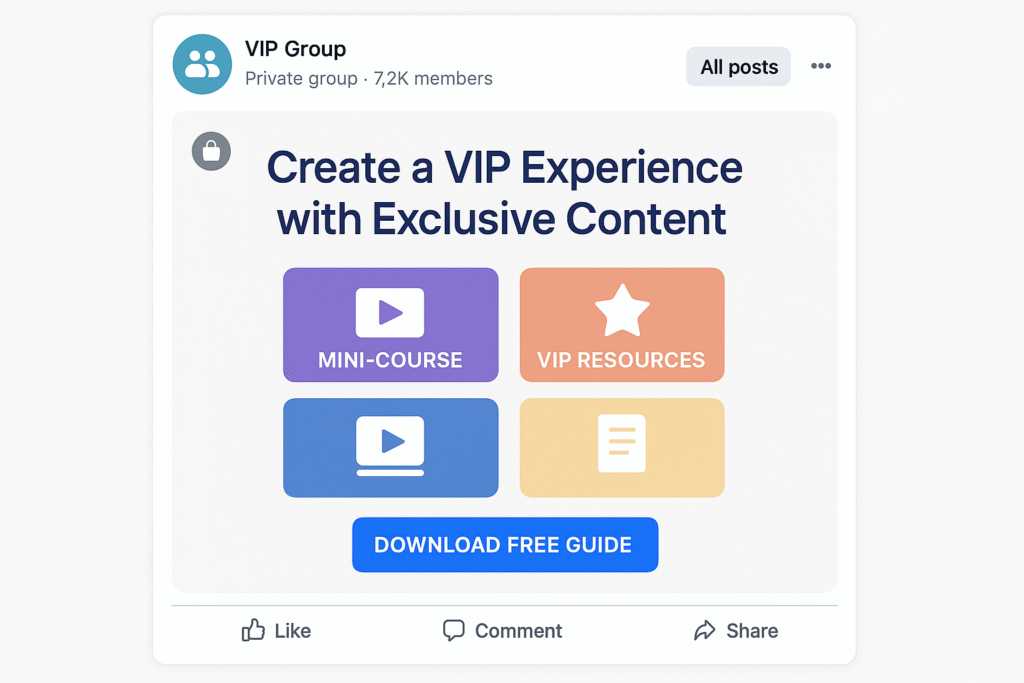
People join and stay active in Facebook Groups for marketing, mainly to access exclusive content they can’t find in other public groups. This strategy offers VIP access, creating unique Facebook Group experiences.
You can deliver valuable resources like PDF guides, free eBooks, or mini-courses via Facebook’s Guides feature. This Facebook Group strategy not only encourages people to join Facebook groups but also increases member retention and strengthens loyalty.
When members get exclusive, valuable resources, their loyalty to your Facebook group and brand deepens.
To scale your Facebook Group marketing, consider building multi-tiered communities.
Start with a free Facebook group offering valuable content, and then introduce a premium tier with paywalls for deeper, more personalised content. This community-driven model allows you to monetise Facebook Groups while giving immense value to a larger audience.
2. Engagement Challenges & Facebook Group Gamification
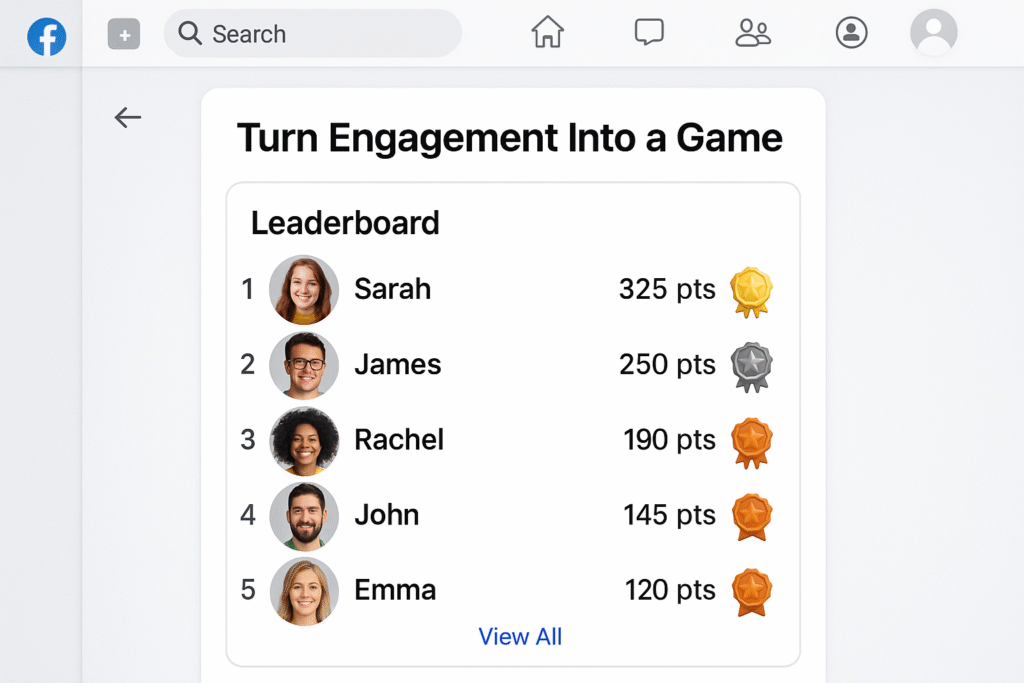
Friendly, fun competition can boost engagement and interaction within your Facebook Group. Engagement challenges and gamification techniques keep group members actively engaged and participating.
You can create a point system for actions like commenting, posting helpful content, or joining discussions in your Facebook group. Feature top contributors on a leaderboard to encourage further engagement.
Reward active members with exclusive content, free products, or discounts for achieving milestones. A “New Member Challenge” can prompt newcomers to introduce themselves, comment, or share thoughts on topics related to your business. This boosts immediate engagement and helps new members integrate into the Facebook community.
Free challenge templates from sites like PosterMyWall or VantageFit offer structured ways to organise engagement tactics in your group. These Facebook group marketing strategies turn passive browsing into active participation, building a self-sustaining community.
3. Harness AI Chatbots for Facebook Group Automation & Support
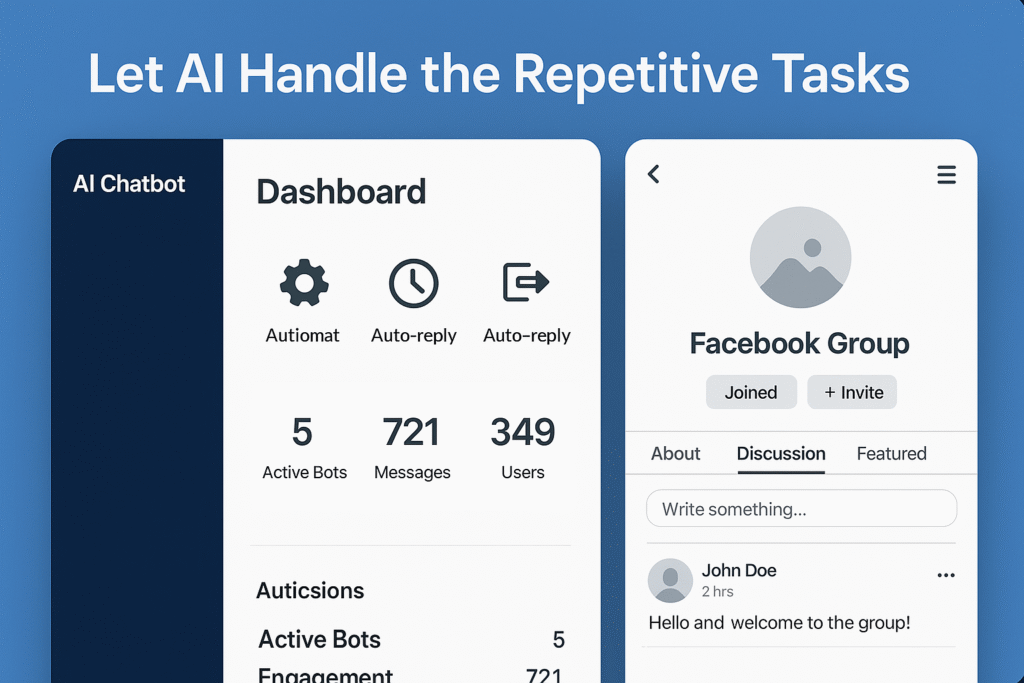
As Facebook Groups for marketing grow, managing them becomes more time-consuming.
AI chatbots and automation tools can manage repetitive administrative tasks within Facebook Groups. These tools can manage up to 30% of your group administration, handling repetitive tasks and freeing up your time for genuine connections. Facebook Group Admin Assist offers automation features to help you streamline daily tasks.
Set up keyword filters to block spam, auto-approve new applicants who meet set criteria, and schedule automated welcome posts for new members. These tools also allow you to set content moderation rules, ensuring group quality without constant manual intervention.
Automation ensures a smooth, high-quality experience for members, leaving you free to focus on meaningful discussions and adding direct value.
4. Utilise “Guides” for Facebook Group Mini-Courses & Resources
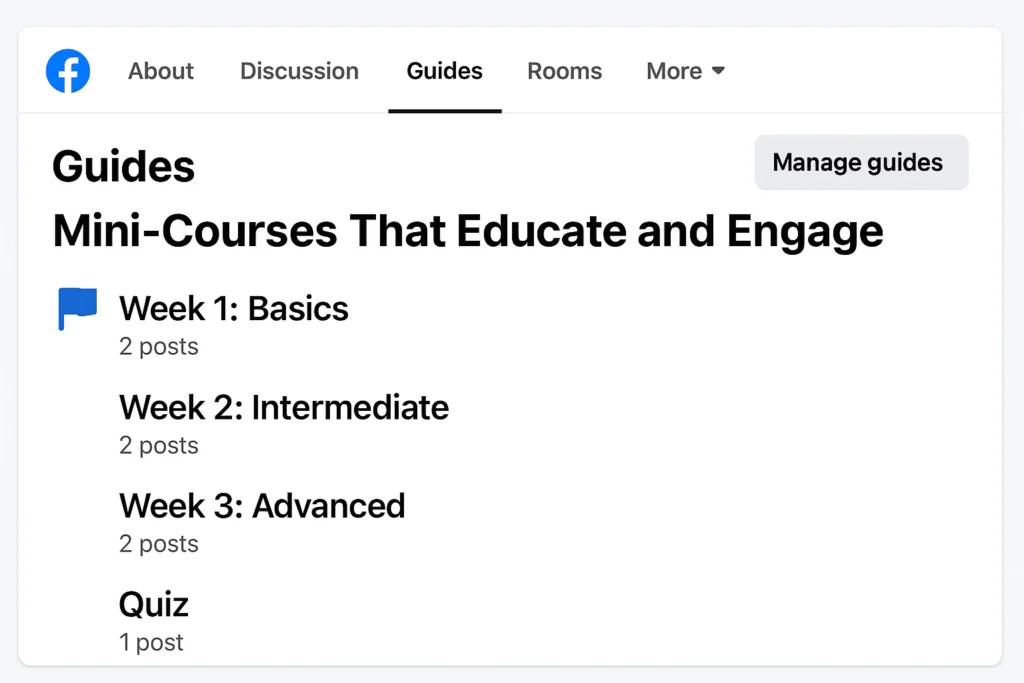
Facebook’s “Guides” feature helps businesses organize and deliver valuable content to group members.
It lets you turn your group content into digestible mini-courses or resource libraries, making it easier for members to find and access helpful material. Transform your best how-to posts, Q&A sessions, and success stories into well-organised guides that members can follow.
This not only adds immense value for your group members but also positions your brand as an industry expert.
For example, a fitness Facebook group could create a “Beginner Workout Guide”, while a marketing community might offer a “Social Media Content Planning Guide”. By providing educational content through guides, you boost the Facebook group’s value and encourage deeper engagement from your audience.
5. Create Micro-Niche Facebook Group Communities
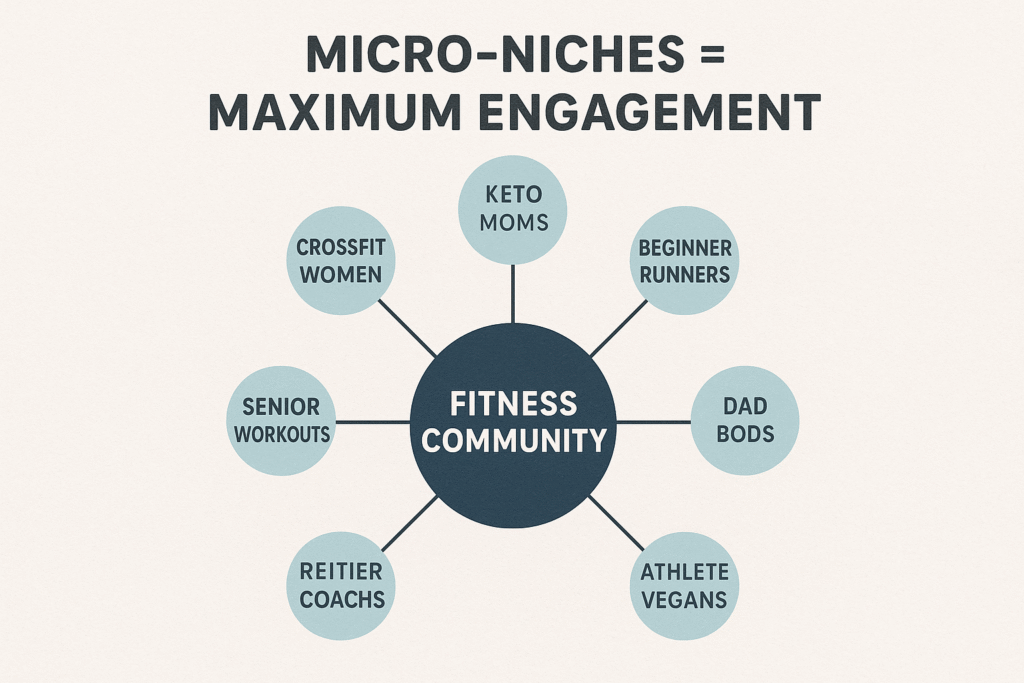
While broad niches attract many members, micro-niche communities within your Facebook Group often result in higher engagement and conversion rates. This means focusing on highly specific interests that resonate deeply with a segment of your target audience.
For example, instead of a general “fitness group”, create a micro-niche group like “Keto Diet for Busy Moms” or “Marathon Training for Beginners”. These micro-niche communities attract individuals with specific needs, fostering deeper connections and more relevant discussions.
This precision ensures that your members are your ideal customers, leading to meaningful interactions and higher conversion rates. A local fitness studio could create or join groups for “local health and wellness” enthusiasts, directly connecting with individuals seeking their services.
6. Conduct Live Poll-Based Market Research in Facebook Groups
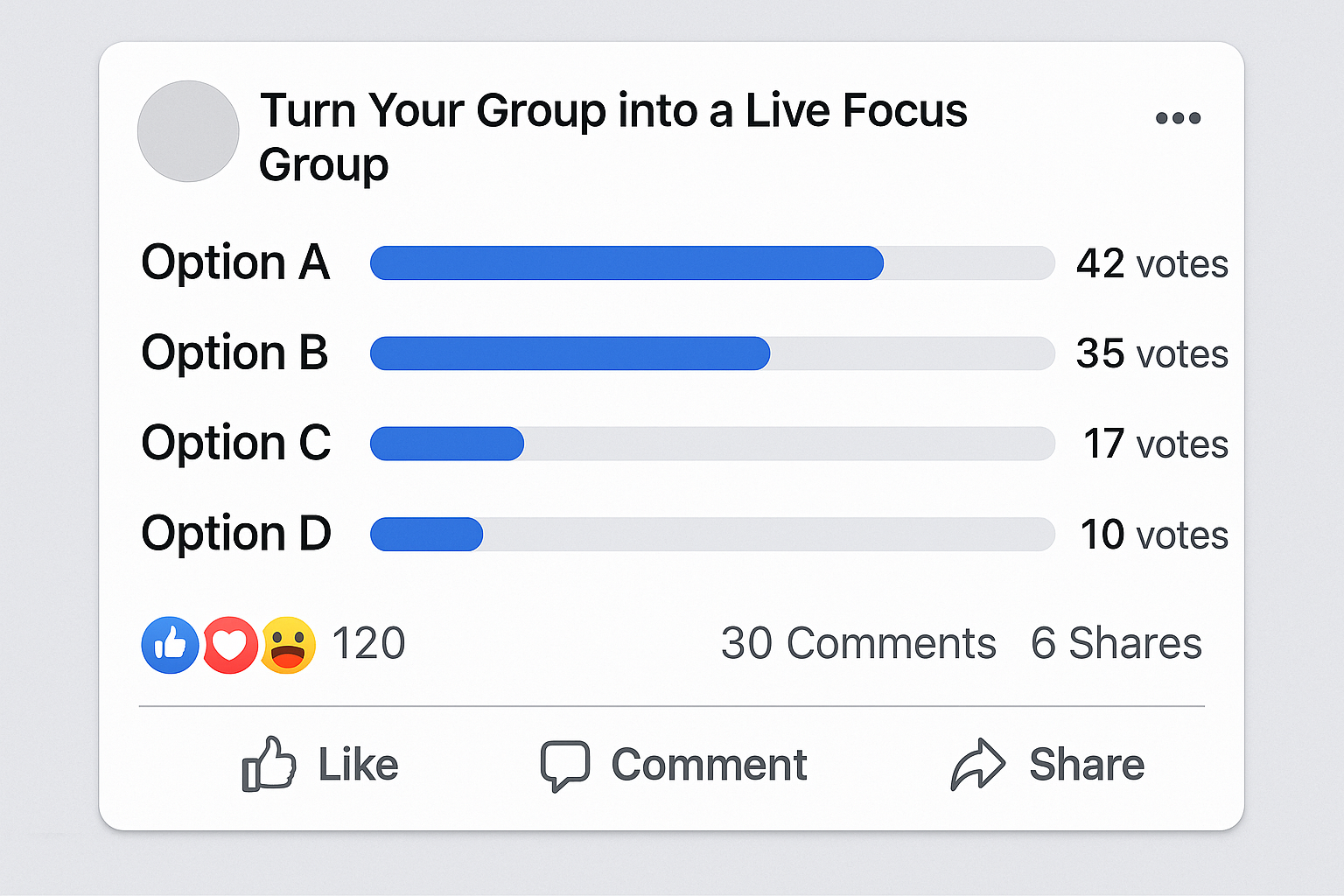
Your Facebook Group serves as a built-in focus group for gathering valuable insights. Live polls are an excellent way to gather real-time feedback on your products, services, or industry trends from your audience.
Use polls to ask about members’ biggest challenges, goals, or test new product names, features, or pricing before launching. The beauty of this strategy is in its transparency and interactivity, which boost engagement. After collecting responses, share the results with your group and explain how you will use their feedback to improve your offerings. This approach provides invaluable market insights and shows that members’ opinions are valued, fostering trust and strengthening the community.
7. Run Secret Beta Test Facebook Groups
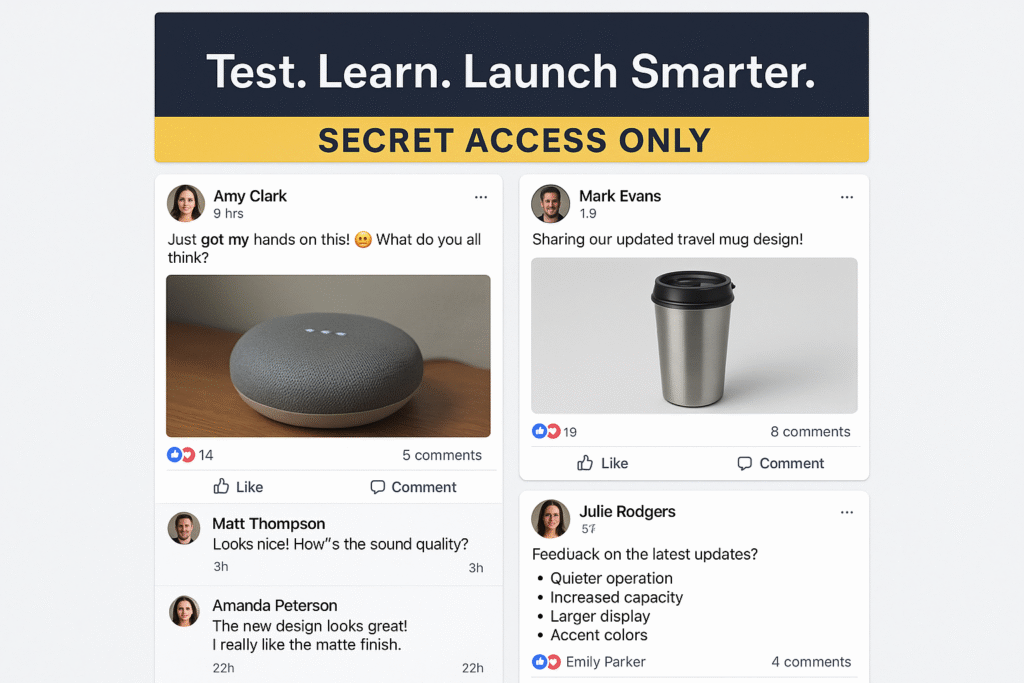
For businesses launching new products or services, a “secret Facebook Group” is an excellent beta testing environment. These groups are set to “Secret,” meaning only invited members can find and join, fostering exclusivity.
Invite loyal customers or highly engaged members to test new products, providing early, invaluable feedback. This helps refine your product before a full launch, while fostering exclusivity and ownership within your beta testers. These beta testers often become passionate brand advocates, sharing their experiences and generating buzz for the official launch. It’s a powerful strategy for co-creating with your audience and building a loyal Facebook Group community.
8. Encouraging User-Generated Content in Facebook Groups
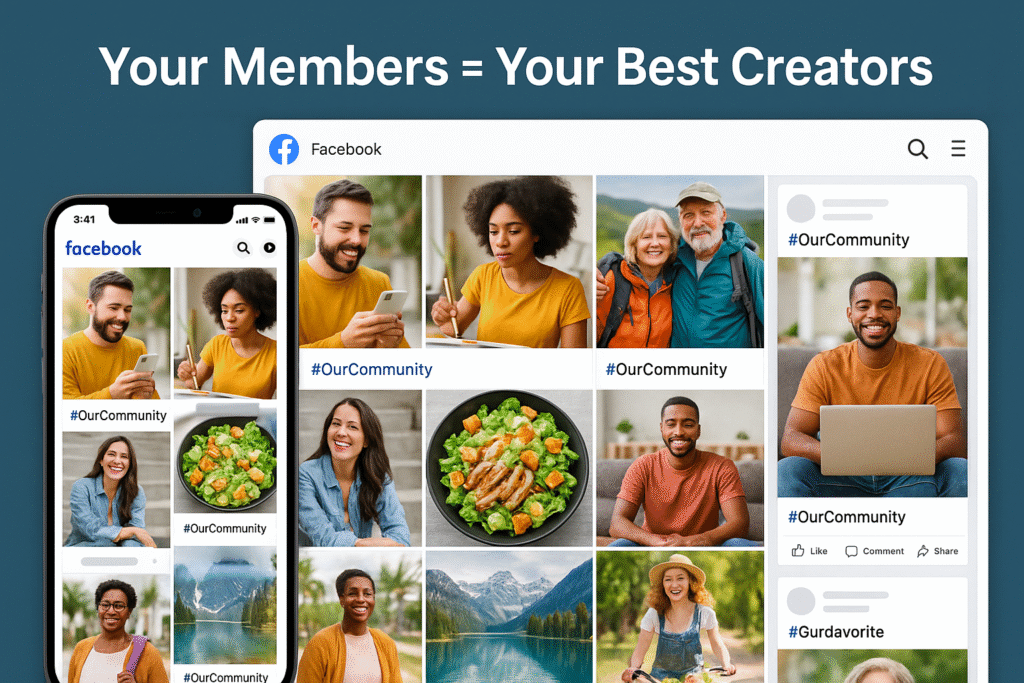
User-generated content (UGC) fosters authentic engagement and reduces content creation efforts.
This strategy turns passive members into active contributors who feel invested in the community.
To promote UGC effectively:
- Ask members to share photos or experiences through targeted prompts
- Highlight and celebrate contributions by sharing or commenting on member posts
- Run photo contests with easy participation requirements
- Set up community-specific hashtags for easy content tracking
UGC builds trust and provides a wealth of authentic content for your Facebook Group.
When members see their contributions appreciated, they’re more likely to engage again, creating a positive cycle of group engagement.
9. Collaborate with Complementary Businesses & Influencers
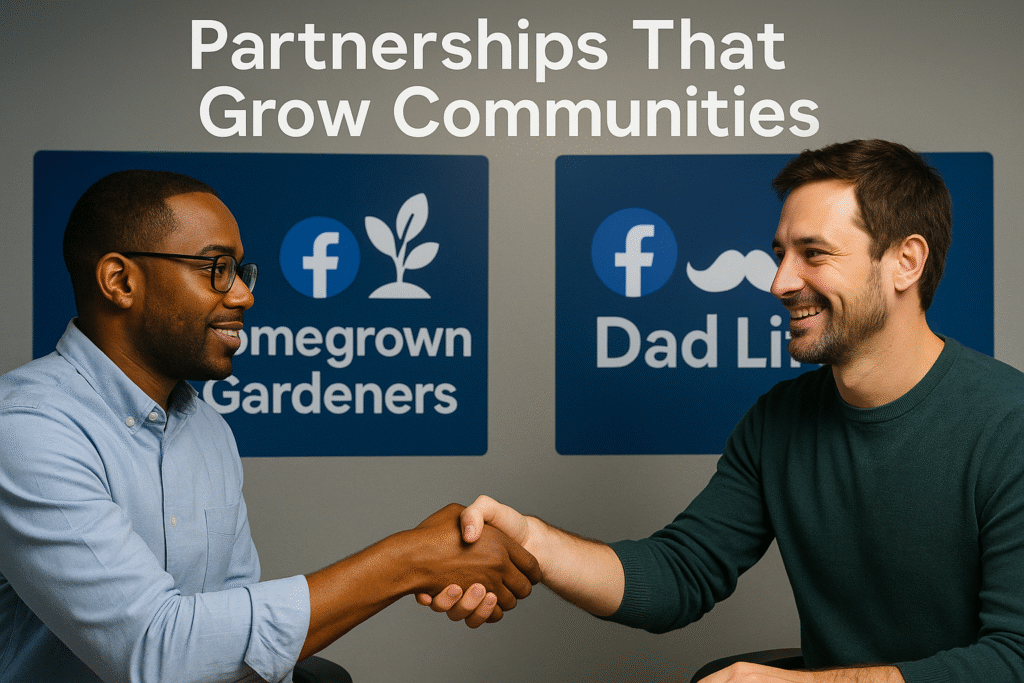
Strategic partnerships expose your Facebook Group community to wider, relevant audiences without direct advertising.
Cross-Promotion: Identify other Facebook Groups for marketing or businesses that share a similar audience but offer non-competing products or services. Collaborate on efforts like sharing each other’s groups, co-hosting giveaways, or organizing joint events. This introduces your Facebook group to a new pool of members who are already interested in related topics.
Influencer Partnerships: Collaborate with nano- and micro-influencers within your niche. These influencers, with 1,000 to 50,000 followers, have highly engaged audiences and deliver significant ROI for your Facebook group marketing efforts. Their endorsement can add credibility and attract new members to your group.
Promote their content on your public Facebook Page and tag them, encouraging them to join your Facebook Group. Their presence can attract others who see them as credible figures, boosting group engagement.
10. Implement a Consistent Facebook Group Content Calendar
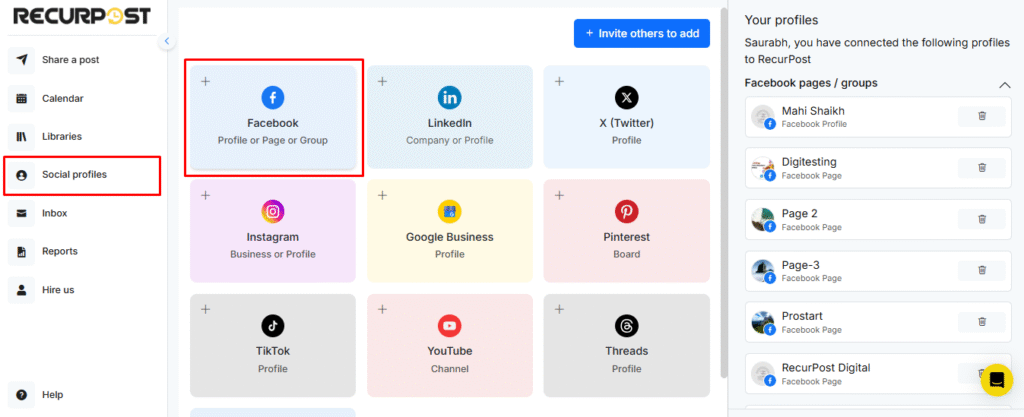
Consistent, high-quality content drives engagement within Facebook Groups. A consistent content calendar is essential for keeping activity up, ensuring variety, and avoiding content burnout for you and your group members.
Diverse Content Types: Share various content to keep your Facebook group dynamic and engaging. Include how-to posts, polls, Q&A sessions, and success stories. Use Facebook Live videos, native videos, images, GIFs, memes, and infographics to keep content varied. Short videos, particularly Reels, outperform other content types in engagement (Reels at 0.23%, Videos at 0.17%, Photos at 0.08%, Text at 0.07%, Links at 0.04%).
Consistent Scheduling with RecurPost: Maintain a regular posting schedule, ideally 2-3 times a week. Brands typically post 7 times per week on Facebook. Use themed days like “Question Monday” or “Tips Thursday” to create a rhythm that members look forward to, driving consistent discussion.
Leverage Templates: Use free social media calendar templates from tools like Asana or Smartsheet to streamline content creation. These tools help plan, organize, and track content, ensuring balance and timely delivery.
11. Utilize Facebook Events for Webinars & Workshops
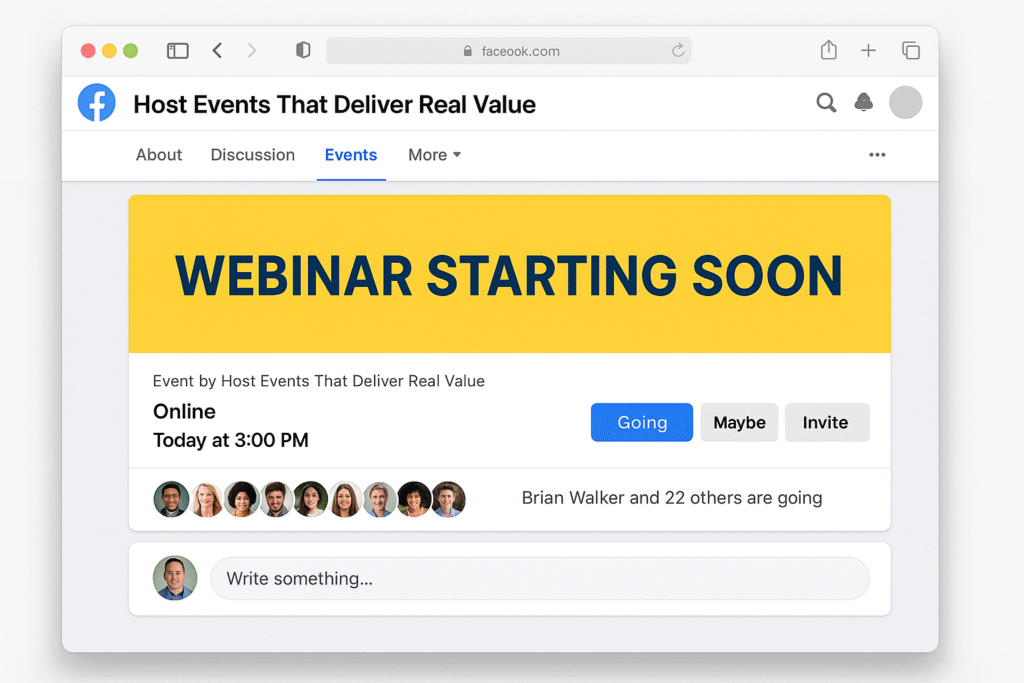
Facebook Events within groups drive engagement and generate leads, especially for educational or community-focused businesses.
Host Engaging Events: Organise webinars on trending topics, host live Q&A sessions, or announce local workshops to provide direct value. These events establish your brand as a thought leader in the industry, offering direct value to your audience.
Strategic Promotion: Promote your event within your group page, but also cross-promote across your other social media platforms, email lists, and website. Share your event across your other platforms, email lists, and website to maximise attendance.
Follow-Up Engagement: The conversation doesn’t stop when the event ends. Post event highlights, recordings, or key takeaways in the group to continue the conversation and offer value to those who missed the live session. This sustained engagement builds trust, leading to more leads and sales for your business.
12. Grow Your Email List with Entry Questions in Facebook Groups
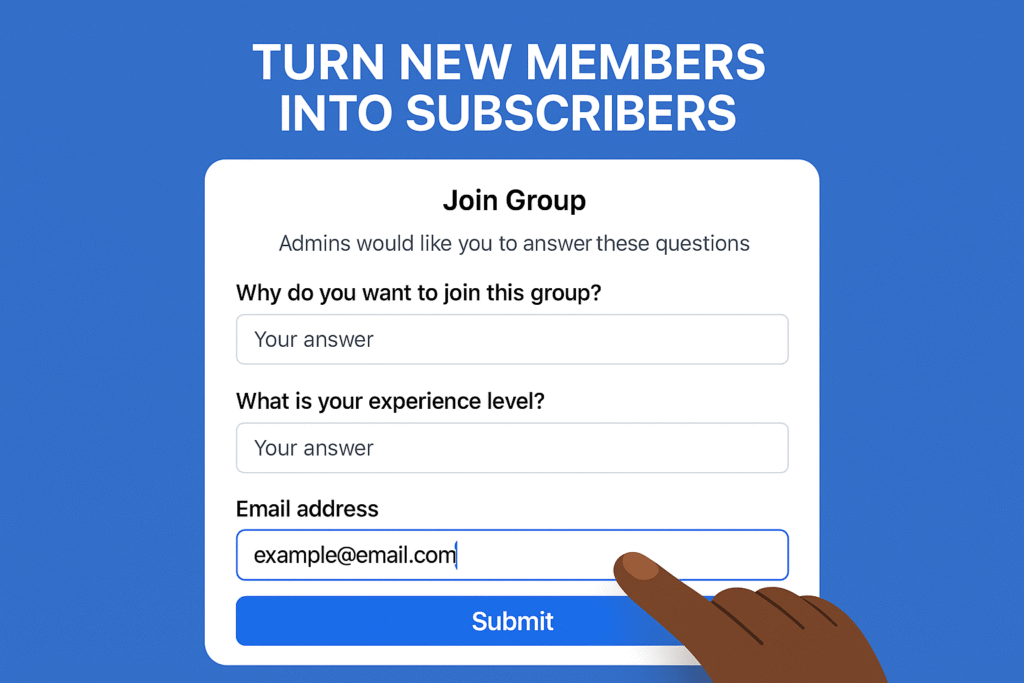
Strategic screening questions during Facebook’s group joining process collect email addresses for list building. When new members request to join, ask if they’d like to subscribe to your email list.
To maximise effectiveness, phrase the question like: “Would you like to subscribe to [newsletter name] for [specific value]? If yes, please type your email address here.” This strategy clearly communicates the benefit of subscribing, boosting opt-in rates. Take screenshots of responses as evidence of consent.
After approving members, their responses disappear permanently. Many successful group owners maintain spreadsheets documenting opt-ins and screenshots as proof of permission. Welcome new subscribers with a message outlining additional benefits, such as exclusive content, resources, or early access to offers.
These might include exclusive content, resources, or early access to offers unavailable in the group.
Measuring Your Success: KPIs and ROI
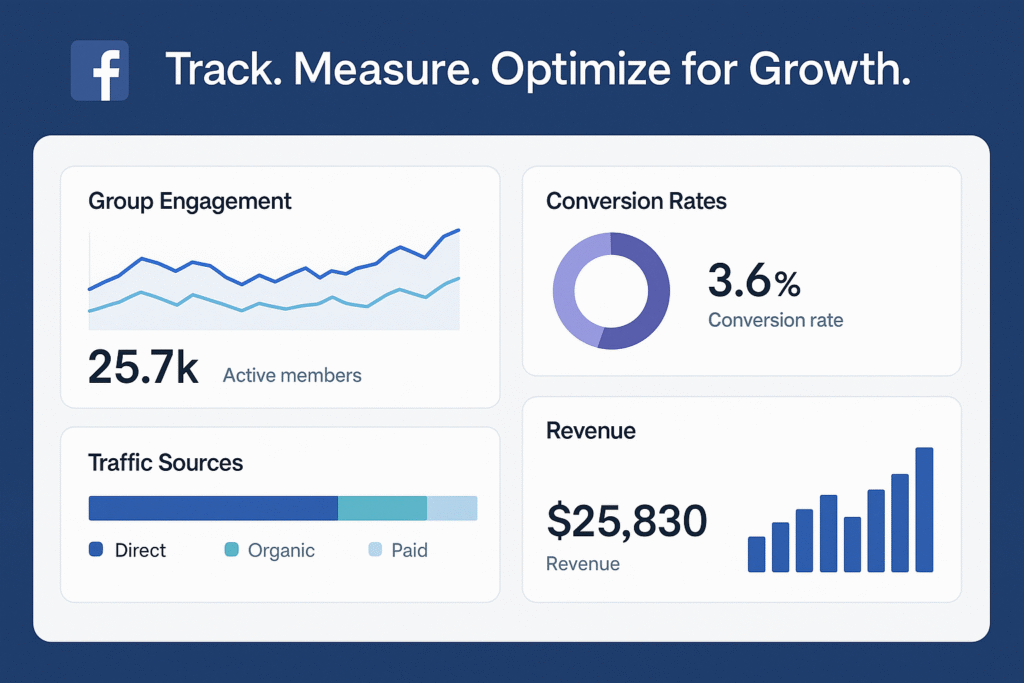
Tracking and analyzing metrics help determine if your Facebook Group marketing efforts are effective. By focusing on key performance indicators (KPIs) and calculating ROI, you can refine your strategies and ensure the continuous growth of your Facebook group.
Key metrics like engagement, group insights, and member growth are essential for understanding how well your Facebook group marketing strategy is performing. Tracking these KPIs will allow you to measure ROI and adjust your efforts to drive better results.
Key Performance Indicators (KPIs) for Facebook Groups
The right metrics reveal your Facebook Group’s health and effectiveness.
- Engagement Rates: This is a primary indicator of how much your audience interacts with your content. Track likes, comments, shares, and reactions. While the average engagement rate on Facebook is around 0.063% across all industries, understanding which content types perform best within your Facebook group is crucial. For instance, Reels typically see the highest engagement (0.23%), followed by videos (0.17%), photo posts (0.08%), text posts (0.07%), and link posts (0.04%). Analyzing these trends helps you tailor your content strategy for your Facebook group.
- Reach & Impressions: These metrics tell you how many unique users are seeing your content (reach) and the total number of times your content is displayed (impressions). While organic reach can be challenging, understanding these numbers helps gauge content visibility in your Facebook group.
- Conversions: Ultimately, for businesses, conversions are key. This includes tracking leads generated and sales originating directly from your Facebook group marketing efforts. The average conversion rate for Facebook ads across industries is approximately 8.78%. Specific industries, like fitness (14.29%) and education (13.58%), often see even higher conversion rates.
- Referral Traffic: Utilise tools like Google Analytics to track how much traffic your website receives from your Facebook Group. This helps quantify the group’s impact on your overall web presence.
- Member Growth & Retention: Monitor the number of new members joining your Facebook group versus those leaving each week. This provides insights into the group’s appeal and your ability to retain a vibrant community of engaged members.
Calculating and Maximizing Your ROI
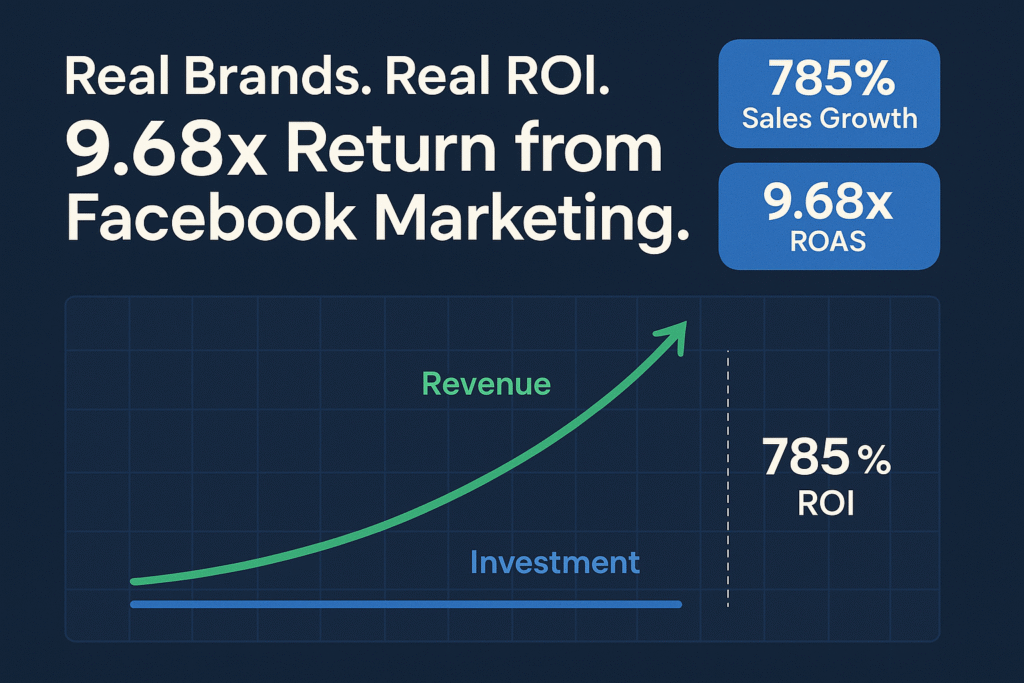
Return on Investment (ROI) measures the value gained from money and effort spent. For Facebook Group marketing, this can be calculated using the formula:
ROI = {(Total Revenue – Total Investment) / Total Investment} x 100.
Tracking ROI helps you determine whether your efforts in growing and managing your Facebook group are delivering the desired results. It’s crucial to evaluate how well your Facebook group marketing strategy contributes to your business’s bottom line.
What is a Good ROI?
For Facebook Ads, a return on ad spend (ROAS) between 4x and 5x is generally considered good, though some companies achieve 10x or more with optimized strategies.
Success Stories: Real-world examples highlight the potential. Seltzer Goods, a B2C brand, saw a remarkable 785% increase in monthly sales and a 9.68x ROAS from their Facebook ad campaigns. Other case studies demonstrate significant sales increases (e.g., $15,000 in sales, $10,000 profit) and substantial growth in page likes (e.g., 200% increase) directly attributable to Facebook marketing efforts.
Factors for High ROI
Maximizing ROI involves several critical elements: setting clear campaign objectives, deeply understanding your target audience, crafting compelling ads, optimizing landing pages for conversions, meticulously tracking conversions, and effectively managing your budget and bidding strategy. Research also indicates that visual elements play a significant role; making your logo visible, especially within the first two seconds of an ad, can result in 5x higher ROI on Facebook. Furthermore, ads optimized for mobile, using square and tall formats, can nearly double returns compared to non-mobile-friendly assets.
Addressing Challenges: It’s important to acknowledge that Facebook’s organic reach has declined, with an average engagement rate of 0.06%. This means relying solely on organic efforts might not yield desired results. A diversified strategy that integrates paid advertising, consistent, high-quality content, and active participation in Facebook groups for marketing is essential to overcome these challenges and ensure a positive ROI.
Conclusion
Facebook Groups for marketing offer more than just a place to post; they’re powerful engines for community building, lead generation, and sustained business growth. Strategically defining your target market, optimizing your setup, and managing your Facebook group with intention lays the groundwork for a thriving Facebook community.
The 12 proven strategies, ranging from exclusive content creation to smart use of automation and influencer partnerships, are designed to align with your broader Facebook marketing strategy. They help foster real engagement and deepen trust through continuous group discussions and member contributions.
By providing valuable resources, nurturing member interaction, and adapting to changing trends, your group can evolve into a high-impact Facebook community. When using Facebook Groups for marketing, it’s not about chasing numbers; it’s about creating spaces aligned with your group’s interests, where people stay because they find genuine value.
Building genuine connections gives your brand an edge in the crowded digital space. Consistent presence and purposeful leadership transform Facebook Groups into lasting channels for growth and trust.
Frequently Asked Questions
1. Can you use Facebook Group insights to improve your products or services?
Absolutely. Analyze post reactions, poll results, and group discussions to identify patterns in what your members care about. Their feedback often reveals real-world needs, helping you tweak offers or create new ones they actually want.
2. How can you re-engage members who’ve gone quiet in your group?
Try tagging them in meaningful group posts, running exclusive flash polls, or even DMing them with a personal invite to an upcoming group event. A little personal attention can reignite interest and remind them why they joined your Facebook community.
3. Should you use a personal profile or a business profile to post in your group?
Posting from your personal profile often feels more authentic and helps build trust faster. But if you want a more branded presence, the Facebook app allows you to post as your Facebook Page too. Just make sure it doesn’t come off as overly salesy.
4. How do you protect your Facebook Group from spam and fake profiles without scaring off genuine members?
Set up smart entry questions, clearly outline your Facebook group rules, and use keyword filters with Admin Assist to catch red flags early. Balance that with a warm, welcoming message so your group still feels open and friendly.
5. Can Facebook Groups help with SEO outside the platform?
Yes, public group posts can appear in Google search results. Use relevant keywords in your group description, name, and post titles to give your content a chance to rank beyond Facebook and attract fresh traffic.

Shalini Nagar is an experienced content writer with a proven track record of creating diverse and engaging content across various formats. With years of expertise in crafting blogs, articles, she excels at delivering compelling narratives tailored to different audiences.

